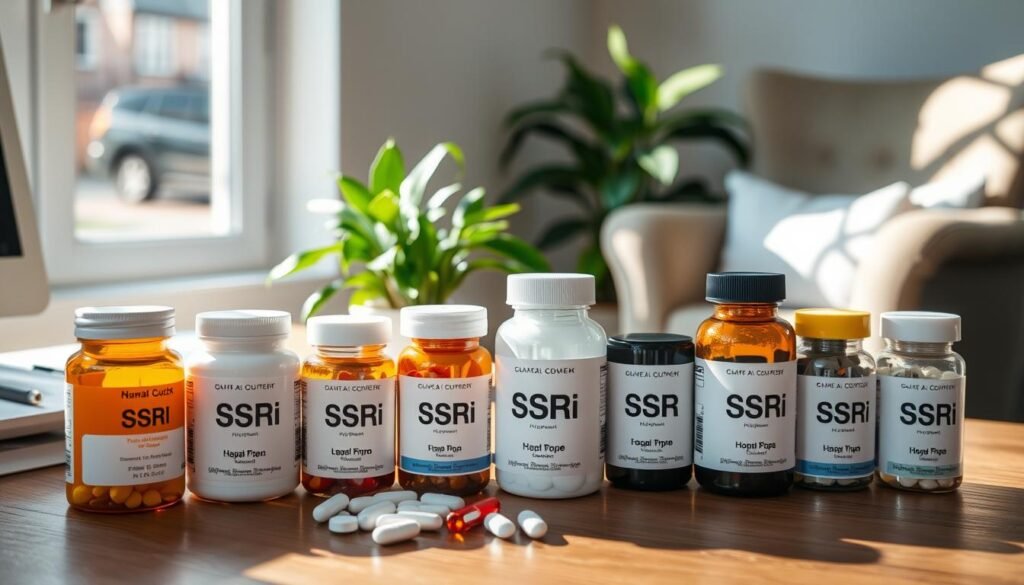Did you know that about 40 million adults in the U.S. face anxiety disorders yearly? This shows how important it is to find good treatments for anxiety. It’s crucial for a person’s well-being and quality of life. This piece looks into the top antidepressant for treating anxiety. It covers different medications, how well they work, and possible side effects. By understanding these medications, people can choose the best option for anxiety treatment today.
Key Takeaways
- Anxiety disorders affect around 31.1% of adults in the U.S. at some point in their lives.
- SSRIs are the first-line treatment for anxiety and depression, prescribed to over 40 million adults.
- SNRIs also represent effective options, accounting for approximately 9% of psychiatric medication prescriptions.
- Regular monitoring and follow-up appointments are essential to assess the effectiveness and side effects of anxiety medications.
- Alternative treatments, such as buspirone and beta-blockers, offer additional options for managing anxiety symptoms.
Understanding Anxiety Disorders
Anxiety disorders are a group of mental health conditions. They are marked by extreme fear or anxiety. This can include generalized anxiety disorder, panic disorder, and social anxiety disorder, which greatly affect everyday life.
They often show up as constant worry, feeling restless, being tired, and having trouble focusing. These symptoms can harm your overall well-being.
In the US, anxiety disorders are very common, with about 40 million adults affected each year. Around the world, about 5% of adults deal with depression. Interestingly, nearly half of those with major depression also have an anxiety disorder. It’s crucial to understand these issues to get the right treatment.
To diagnose generalized anxiety disorder (GAD), one must have intense worry for many days over six months. Symptoms include:
- Feeling restless or on edge
- Easily irritated
- Difficulty concentrating
- Trouble sleeping
- Fatigue despite rest
- Muscle tension
About 70 to 80% of people with depression see a big drop in symptoms with treatment. Finding the right medication for anxiety is key. It helps a lot in fighting anxiety effectively.
Types of Antidepressants Used for Anxiety
There are many types of antidepressants used to treat anxiety. Each kind works differently and offers unique advantages. Selective Serotonin Reuptake Inhibitors (SSRIs) are the top choice for many. They are known for working well with fewer side effects. SSRIs like fluoxetine (Prozac) and sertraline (Zoloft) start to work in two to six weeks. Most people take them for six to twelve months. They are effective for both anxiety and depression, which is why doctors often recommend them.
Serotonin-Norepinephrine Reuptake Inhibitors (SNRIs) are also commonly used for treating anxiety. SNRIs, such as venlafaxine (Effexor), might not work as well for OCD as SSRIs. But they still offer benefits within a few weeks of starting them.
There are other options like Tricyclic Antidepressants (TCAs) and Monoamine Oxidase Inhibitors (MAOIs) for anxiety and depression. TCAs aren’t as popular because they have more side effects. However, they can be helpful if other treatments don’t work. MAOIs are for specific situations since they have risks and dietary limits. Knowing about these medications helps doctors find the best match for each person.
| Type of Antidepressant | Common Examples | Time to Effect | Usage Notes |
|---|---|---|---|
| SSRIs | Fluoxetine (Prozac), Sertraline (Zoloft) | 2-6 weeks | First-line treatment for anxiety and depression |
| SNRIs | Venlafaxine (Effexor), Duloxetine (Cymbalta) | 2-6 weeks | Effective for generalized anxiety disorder |
| TCAs | Amitriptyline, Imipramine | 1-2 weeks | Rarely prescribed due to higher side effects |
| MAOIs | Phenelzine, Tranylcypromine | 1-2 weeks | Used in specialized cases, significant dietary restrictions |

The Best Antidepressant for Anxiety: SSRIs
Selective serotonin reuptake inhibitors, or SSRIs, are key for treating anxiety disorders. They boost serotonin levels in the brain, which helps improve mood and stabilizes emotions. SSRIs often take 3 to 8 weeks to show full effects, requiring patience from those seeking relief.
How SSRIs Work
SSRIs mainly prevent the reabsorption of serotonin in the brain. This increases serotonin’s availability, essential for mood regulation. As top antidepressants for anxiety, SSRIs are preferred for their non-addictive qualities. They have a lower risk of abuse than other medications like benzodiazepines. However, some users may experience side effects like nausea, dizziness, and sexual dysfunction.
Common SSRIs Prescribed
Important SSRIs include:
- Sertraline (Zoloft) – Approved for Major Depression and PTSD.
- Fluoxetine (Prozac) – Known for treating various anxiety disorders.
- Escitalopram (Lexapro) – Works for Generalized Anxiety Disorder and more.
- Paroxetine (Paxil) – Known for the highest risk of withdrawal symptoms.
- Citalopram (Celexa) – Commonly prescribed with dosage limits for the elderly.

Regular check-ups with doctors are crucial when on SSRIs. These visits help manage any side effects and check the medication’s success. Understanding SSRIs better confirms their place as the top choice for anxiety treatment.
Selective Norepinephrine Reuptake Inhibitors (SNRIs)
SNRIs are a key choice for treating anxiety. These meds stop norepinephrine and serotonin from being taken back up in the brain. This can boost mood and help reduce anxiety symptoms. They have proven effective in various studies, particularly for those also battling chronic pain.
Effectiveness of SNRIs for Anxiety
SNRIs usually show results in 6 to 8 weeks. They help those with generalized anxiety or panic disorders. They are also useful for managing chronic pain, offering a two-fold benefit.
Commonly Prescribed SNRIs
Some widely used SNRIs are:
- Duloxetine (Cymbalta) – Approved for anxiety and some chronic pain issues.
- Venlafaxine (Effexor XR) – Cleared for certain anxiety disorders and panic disorders.

However, SNRIs can have side effects like nausea, dizziness, and sexual function changes. It’s important to talk with doctors about these issues. This ensures treatments are customized for the best care.
| SNRIs | Primary Indications | Common Side Effects |
|---|---|---|
| Duloxetine (Cymbalta) | Anxiety, chronic pain | Nausea, dry mouth, fatigue |
| Venlafaxine (Effexor XR) | Anxiety disorders, panic disorder | Dizziness, headache, sweating |
Grasping how SNRIs tackle anxiety can lead to better care. It can make life better for those facing anxiety disorders.
Other Antidepressants and Anxiety Relief
Many different antidepressants can help with anxiety besides the usual SSRIs and SNRIs. Two key types are tricyclic antidepressants and monoamine oxidase inhibitors. They are good options when other treatments don’t work. But, they come with special considerations.
Tricyclic Antidepressants (TCAs)
Tricyclic antidepressants include drugs like amitriptyline and imipramine. They boost neurotransmitter levels, improving mood and easing anxiety. However, these meds can cause weight gain and dry mouth.
Because of these side effects, doctors often use TCAs only after other meds have failed.
Monoamine Oxidase Inhibitors (MAOIs)
MAOIs, such as phenelzine and tranylcypromine, block an enzyme. This enzyme usually breaks down serotonin and norepinephrine. Stopping it can reduce anxiety symptoms.
MAOIs are rare choices, due mainly to their strict dietary rules and risks like low blood pressure and dizziness. They are usually last picks for those not helped by SSRIs or SNRIs.
| Medication Class | Examples | Effectiveness | Common Side Effects | Typical Use |
|---|---|---|---|---|
| Tricyclic Antidepressants | Amitriptyline, Imipramine | Effective for anxiety | Weight gain, dry mouth | Second/third-line treatment |
| Monoamine Oxidase Inhibitors | Phenelzine, Tranylcypromine | Effective for anxiety | Hypotension, dizziness | Last-resort treatment |
Benzodiazepines as a Treatment Option
Benzodiazepines help in treating anxiety, especially for those needing quick relief. These medicines, like diazepam (Valium) and alprazolam (Xanax), work fast to lower anxiety. They enhance GABA, a relaxing neurotransmitter, giving short-term relief in acute anxiety times.
How Benzodiazepines Help
Benzodiazepines are popular for their rapid action. Unlike SSRIs, which take weeks to work fully, benzodiazepines offer quick relief. This makes them helpful in urgent situations. They help people handle anxiety better.
Risks of Long-term Use
However, using benzodiazepines for a long time comes with risks. Long-term use can cause dependency, withdrawal symptoms, and a higher chance of addiction. It’s vital for patients and doctors to watch how long they are used. Tolerance can happen, needing more of the drug to get the same effect. It’s best to use benzodiazepines for a short period.
Alternative Medications for Anxiety Management
There are many ways to manage anxiety without always turning to standard drugs. Two important alternatives are buspirone and beta-blockers. They are great for those looking for different ways to handle anxiety symptoms. Each has its unique advantages, fitting various needs and situations.
Buspirone and its Benefits
Buspirone is not like the usual anxiety drugs. It is mainly for people with generalized anxiety disorder. It works by targeting serotonin receptors. This helps reduce anxiety but doesn’t make you sleepy or as dependent as other drugs might. So, it’s a safe, long-term option for treating anxiety differently. Buspirone is a good choice if you’re wary of standard anti-anxiety meds.
Use of Beta-Blockers in Anxiety Treatment
Beta-blockers, like propranolol, are mostly used for heart issues. But, they can also ease physical anxiety symptoms. Symptoms like fast heartbeats and too much sweating benefit from beta-blockers. This is especially true for people scared of public speaking or performing. Including beta-blockers in your anxiety treatment can give you more options. It adds to the ways to fight anxiety, beyond usual antidepressants.
Medication Management and Choosing the Right Antidepressant
Choosing the right antidepressant requires understanding the side effects and your health. Medication management is key to effective treatment. Many find relief with their first antidepressant. But about 30% go through trial and error to find the best one.
Understanding Side Effects
Side effects can really impact how you feel about your anxiety medication. Common ones include dry mouth, affecting up to 36%, and nausea, which about 24% feel. Others are headaches and insomnia, each affecting about 20%, and loose bowel movements in 10%.
Some side effects may lessen over time, but some can be tough to deal with. It’s important to know this, especially since some antidepressants, like tricyclics, can have more side effects. Up to 70% of people taking tricyclics report them. Knowing about these side effects helps you make better choices.
The Importance of Close Monitoring
Being closely watched by healthcare providers is a big part of managing your medication well. Checking in regularly allows for changes based on how you’re doing and any side effects. Studies show that ongoing care reduces the risk of suicide over time.
A structured plan is important for tracking your progress. This is crucial because stopping antidepressants suddenly can cause withdrawal symptoms in up to 50% of people. Being able to talk openly creates a safe place to share your feelings, helping you stay well during treatment.
| Antidepressant Class | Common Side Effects | Efficacy Statistics |
|---|---|---|
| SSRIs | Dry mouth, nausea, headache, insomnia | 20%-40% initial response rate |
| SNRIs | Weight gain, fatigue, sexual dysfunction | Higher efficacy compared to SSRIs |
| Tricyclics | Sedation, weight gain, dry mouth | Efficacy can be higher than SSRIs |
Taking these factors into account can improve treatment for those with anxiety and depression.
Conclusion
Finding the right antidepressant for anxiety is a personal journey. It involves exploring different medicines like SSRIs and SNRIs. These treatments can greatly reduce symptoms. But, it’s important to know that results can take time and might differ from person to person.
Patience and a willingness to try different options are key. Consulting with mental health experts is crucial too. They can help design a treatment plan that includes both medication and other therapies.
For example, Cognitive Behavioral Therapy (CBT) can be a great addition. It fights anxiety symptoms and encourages a healthier lifestyle. This improves your overall well-being.
In the end, the search for the best medication is a partnership with your healthcare provider. Regular meetings and feedback are important. They ensure the treatment meets your unique needs. This leads to better control over anxiety and improves your life quality.